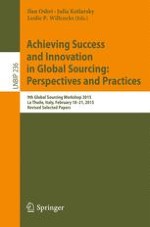This book constitutes revised selected papers from the 9th international Global Sourcing Workshop 2015, held in La Thuile, Italy, in February 2015. The 14 contributions included were carefully reviewed and selected from 14 submissions.
The book offers a review of the key topics in outsourcing and offshoring, populated with practical frameworks that serve as a tool kit to students and managers. The range of topics covered is wide and diverse, but predominately focused on how to achieve success and innovation in global sourcing. The topics discussed combine theoretical and practical insights regarding challenges that industry leaders, policy makers, and professionals face. Case studies from various organizations, industries and countries are used extensively throughout the book to illustrate results and findings.
